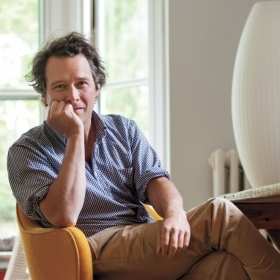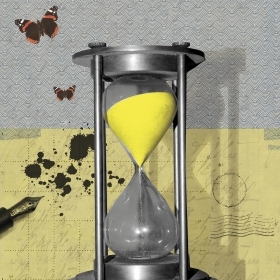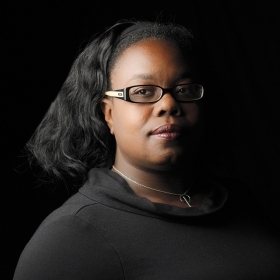Elizabeth Young admits that if people watched her write a poem, they would probably think she was listening to music, given how her body rocks and sways. “I often look like I’m half conducting, half dancing as I sit in front of my computer, coaxing a poem into its final shape,” she says. “I love music, the visual arts, and writing equally, and I suspect that I chose to devote my life to poetry because it combines elements of all three.”
For Young, Knafel Assistant Professor of Humanities and assistant professor of classical studies, humor is also essential to her work because it takes the edge off otherwise weighty or overly serious content—not the least of which is the ponderousness of Poetry itself, with a capital P. “That P should stand for Pleasure, and humor is one way of making sure the P does not stand for Priggish, Pedantic, or any other adjectives that sometimes get in poetry’s way.”
Young began writing as a child, and by fourth grade she was composing “bizarre poems about shellfish orchestras.” She continued to write—and read—a great deal of poetry in high school, but it wasn’t until she encountered the zany vivacity of the New York School poets in college that she realized poetry did not have to be a somber affair. Suddenly, everything clicked. “So much of my early work luxuriated in that lesson, exploring ways to push absurdist humor to its furthest extreme—and to use humor as a way to access both knowledge and transcendence,” she says.
Young taught high-school Latin and adult education, worked at the New York Historical Society, sang and played the cello in several experimental bands, and worked as a DJ before her love of Latin and poetry led her to the doctoral program in comparative literature at the University of California, Berkeley.
“I came to my love of classics through my love of language—I was so intrigued by the workings of Latin,” she says. “Reading, for me, has always been largely about exploring other worlds, and the study of classics amounts largely to the same thing.”
Her first full-length poetry collection, Aim Straight at the Fountain and Press Vaporize (Fence Books), was written while she completed her dissertation. She’d draft poems in the morning at her kitchen table, and then go to a café or library to “dissertate.” “The poems were written in joyful defiance of the kinds of scholarly seriousness I had to assume each afternoon,” she says. “They take the material of classical erudition (in its various guises) and transform it into something silly, joyful, and, on occasion, obscene.”
As one poem’s opening lines explain, “It’s sad when your theories turn out to be flawed. The/ factory girls think they’ve found god in the cheery ciao bellas the/ sailors unfurl like doves at their feet. Nightingales fondle the/ rotary phones. But the mountains don’t mind.”
Today, Young is at work on several more poetry collections, and her first book of criticism, Translation as Muse: Poetic Translation in Catullus’s Rome, was published this September by the University of Chicago Press. In both her teaching and her critical writing, she adheres to the dictum of Ezra Pound that “gloom and solemnity are entirely out of place in even the most rigorous study of an art originally intended to make glad the heart of man.” In the classroom, she tries to teach her Wellesley students that “poetry is, at base, a ludic enterprise that anyone, no matter their background or training, can equally come to enjoy.”
“Many of the themes I’ve been obsessed with in my poetry since my early 20s are central to the course I am currently teaching on cognitive literary studies,” she says. “I’m interested in how the different discursive frameworks we impose upon the world limit or enable our vision of what the world is—and might be.”
Young is also intrigued by a long view of human history that encompasses a sci-fi future and the distant recesses of geological time, she says. “I like thinking between the present, the past, and the future.”
Photo by Richard Howard







We ask that those who engage in Wellesley magazine's online community act with honesty, integrity, and respect. (Remember the honor code, alums?) We reserve the right to remove comments by impersonators or comments that are not civil and relevant to the subject at hand. By posting here, you are permitting Wellesley magazine to edit and republish your comment in all media. Please remember that all posts are public.